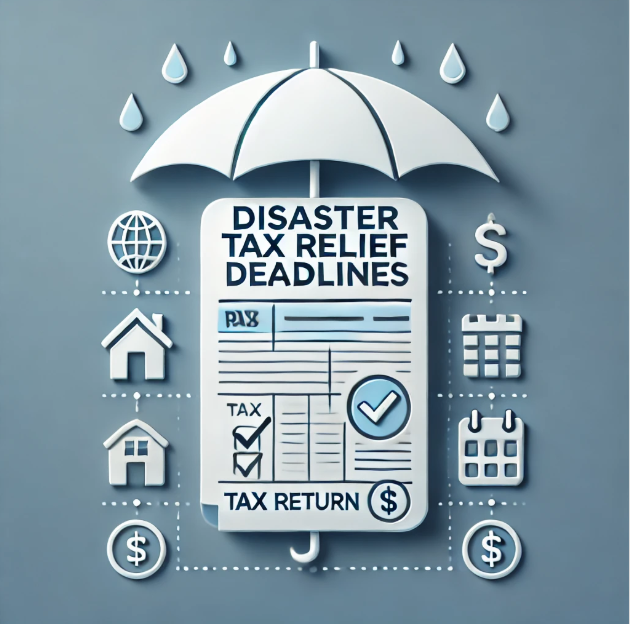
The Internal Revenue Service (IRS) has issued a crucial reminder to taxpayers in disaster-affected areas: depending on their location, 2023 tax returns are due by either February 3, 2025, or May 1, 2025. This relief aims to accommodate individuals and businesses impacted by various natural disasters from late spring through the end of 2024.
Understanding these deadlines and eligibility requirements is critical to ensuring compliance while taking advantage of the extensions provided.
Key Tax Deadlines for Disaster-Affected Taxpayers
February 3, 2025
Taxpayers in the following locations must file their 2023 returns by February 3, 2025:
- Entire States: Louisiana and Vermont
- Territories: Puerto Rico and the Virgin Islands
- Partial Areas: Arizona, Connecticut, Illinois, Kentucky, Minnesota, Missouri, Montana, New York, Pennsylvania, South Dakota, Texas, and Washington state
May 1, 2025
Taxpayers in these regions have until May 1, 2025, to file their 2023 returns:
- Entire States: Alabama, Florida, Georgia, North Carolina, and South Carolina
- Partial Areas: Alaska, New Mexico, Tennessee, Virginia, and West Virginia
Additionally, for those eligible for the May 1 deadline, this date will also serve as the deadline to file 2024 returns and pay any taxes due for that year.
Eligibility for Disaster-Related Tax Relief
Automatically Eligible Taxpayers
The IRS automatically grants tax relief to individuals and businesses whose addresses on record are located in FEMA-designated disaster areas. This includes the following groups:
- Residents in Affected Areas: As long as your primary address is in a qualifying region, you receive the extension automatically.
- Business Owners: Businesses operating in affected areas are also eligible.
Special Cases for Relief
The IRS extends relief to taxpayers outside of the designated areas under certain circumstances:
- If your tax records necessary to meet the deadline are located in an affected area.
- If you are a worker assisting with disaster relief efforts and are affiliated with recognized government or philanthropic organizations.
To request relief under these special circumstances, contact the IRS Disaster Assistance Hotline at 866-562-5227.
Payments on 2023 Tax Returns
While the filing deadlines have been extended, it is important to note that payments for 2023 tax year returns are not eligible for additional time. Payments were originally due in the spring of 2024, prior to the occurrence of these disasters. Taxpayers must ensure these payments have already been made to avoid penalties.
Filing Relief for International Taxpayers: Israel, Gaza, and the West Bank
The IRS has also announced special filing and payment relief for taxpayers affected by the terrorist attacks in Israel. Taxpayers living or conducting business in Israel, Gaza, or the West Bank have until September 30, 2025, to file and pay their 2023 and 2024 tax returns. This relief applies to both individual and business taxpayers in these regions.
Steps to Take if You Qualify for Disaster Relief
1. Verify Your Eligibility
Visit the IRS Disaster Relief Page to confirm your eligibility and review the specific details for your locality.
2. Gather Your Documentation
Prepare the following documents to ensure an accurate and timely filing:
- W-2s, 1099s, and other income-related documents
- Business income and expense records
- Receipts for deductible disaster-related expenses (e.g., home repairs, medical costs)
3. Contact the IRS if Necessary
If your circumstances fall outside the standard eligibility criteria, call the IRS hotline at 866-562-5227 for guidance.
4. Work with a Tax Professional
Navigating disaster-related tax extensions can be complex. Consulting with a professional tax preparer can simplify the process and ensure compliance with all requirements.
Importance of Filing on Time
Even with the extended deadlines, it is essential to file your returns by the appropriate date. Missing these deadlines could result in penalties, interest, and delayed refunds.
Benefits of Timely Filing
- Avoid Penalties: Ensure compliance to prevent late-filing penalties.
- Receive Refunds Faster: Filing early expedites refund processing.
- Maintain Accurate Records: Timely filing supports accurate recordkeeping for future tax years.
How MCMG Tax Can Help
At MCMG Tax, we understand the unique challenges disaster-affected taxpayers face. Our services include:
- Eligibility Verification: Confirming your qualification for IRS disaster relief.
- Accurate Filing: Ensuring all forms and supporting documents are completed correctly.
- Casualty Loss Claims: Assisting with the documentation and filing of casualty losses to maximize deductions.
Let MCMG Tax handle the complexities of disaster-related tax filings so you can focus on recovery. Contact us today to schedule a consultation.
Final Thoughts
The IRS disaster relief extensions for 2023 tax returns provide much-needed breathing room for individuals and businesses affected by natural disasters. By understanding the deadlines, eligibility requirements, and relief options, taxpayers can ensure compliance while reducing stress.
Remember these critical dates:
- February 3, 2025: Deadline for taxpayers in Louisiana, Vermont, Puerto Rico, Virgin Islands, and parts of 12 other states.
- May 1, 2025: Deadline for taxpayers in Alabama, Florida, Georgia, and parts of nine other states. This is also the filing deadline for 2024 returns for these areas.
If you need assistance, MCMG Tax is here to guide you every step of the way. Reach out to our team of experienced professionals to simplify your tax filing process and maximize your benefits.
